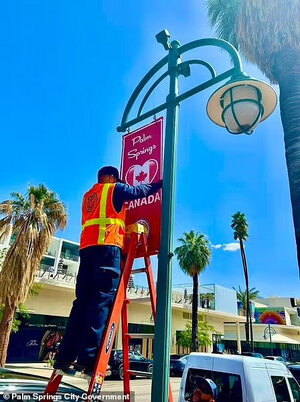- Joined
- Dec 24, 2024
- Messages
- 2,759
- Reaction score
- 7,687
The US economy is set to lose billions of dollars in revenue in 2025 from a pullback in foreign tourism and boycotts of American products, adding to a growing list of headwinds keeping recession risk elevated.
Arrivals of non-citizens to the US by plane dropped almost 10% in March from a year earlier, according to data published Monday by the International Trade Administration. Goldman Sachs Group Inc. estimates in a worst-case scenario, the hit this year from reduced travel and boycotts could total 0.3% of gross domestic product, which would amount to almost $90 billion.
Foreign tourism has been a tailwind for the US in recent years as the cessation of pandemic-era restrictions sparked a resurgence of international travel. But many potential visitors are now rethinking their vacation plans amid increased hostility at the border, rising geopolitical frictions and global economic uncertainty.
One of them is Curtis Allen, a Canadian videographer who canceled an upcoming US vacation after President Donald Trump imposed punitive tariffs on his home country and suggested it should become the 51st US state. Allen and his partner have been on multiple camping trips to Oregon over the years, but this year, they will be traveling around British Columbia instead.
“We’re not just staying home,” said Allen, 34. “We’re going to go spend the same money somewhere else.”
Allen’s hesitance doesn’t stop there. He canceled his Netflix subscription and is actively avoiding American imports at the grocery store.
“Now it takes us double the time, because we’re looking at where the products came from,” he said.
International travelers spent a record $254 billion in the US last year, according to ITA figures. Coming into 2025, the outlook was positive: The ITA projected in early March that the US would welcome 77 million visitors this year, just shy of the 2019 record, before pushing to a new high in 2026.
But those estimates came out just before stories of harsh detentions at US airports, ensnaring travelers from countries like France and Germany, started making headlines. Canadians, meanwhile – the largest group of foreign tourists in the US – are choosing to stay put as Trump ramps up attacks on the country’s economy and sovereignty.
Read More: Hostility at the US Border Chills Vacation Spending From Allies
Almost $20 billion in retail spending from international tourists in the US may be at risk, according to a Bloomberg Intelligence analysis.
Early signs of a sharp pullback are already showing up. Airfares, hotel rates and car rental costs fell in March, according to a monthly Bureau of Labor Statistics report on consumer prices published April 10. Economists at Goldman Sachs and HSBC Holdings Plc said lower demand, including from foreign travelers, probably played a role.
Omair Sharif, president of Inflation Insights, noted the decline in hotel rates was driven by an almost 11% drop in the Northeast in particular, possibly a result of fewer Canadians traveling there.
“Given what we know about how much Canadian travel has fallen off, that’s potentially a bit worrying for that region,” Sharif said.
Summer Season
The timing is “very interesting” for Rainbow Air Helicopter Tours in Niagara Falls — which just invested $25 million in a new building, an enhanced fleet and a virtual reality attraction ahead of the busy summer season — said Patrick Keyes, the firm’s sales and marketing manager. “We are waiting to see the fallout,” he said.Canadian flight reservations to the US are down 70% through September versus the same period last year, according to a report by OAG Aviation Worldwide. Meanwhile US summer bookings are also down 25% among European tourists at Accor SA hotels — which Chief Executive Officer Sébastien Bazin said could be attributed to border detentions creating a “bad buzz” and diverting tourists to other destinations.
“US tariff announcements and a more aggressive stance toward historical allies have hurt global opinions about the US,” Goldman Sachs economists Joseph Briggs and Megan Peters said in a March 31 report.
“This headwind provides another reason — in addition to the more direct negative impacts of tariffs and drag on exports from foreign retaliation that are already built into our US GDP forecast — why US GDP growth will likely underperform consensus expectations in 2025,” they said.
Despite the worsening outlook, Oregon’s tourism commission — known as Travel Oregon — is continuing efforts to attract foreign visitors, said CEO Todd Davidson. His team just came back from a trip to pitch the state at an adventure tourism conference in Vancouver, and in the coming weeks they will be hosting sales and marketing partners from places like the UK, India and Brazil.
At the same time, they’re also contemplating whether the commission will need to shift its strategy more toward domestic visitors as the situation unfolds.
“Oregon is not and will not take its eye off those international markets,” Davidson said. “We will be here when our international visitors feel that they are ready to return.”

---
Looks like the leisure dollar is going to get spent elsewhere, because spent it shall get.
I couldn't find the old thread but also figured that was just a question, this is the actual evidence that the US has severely damaged it's tourism industry.




